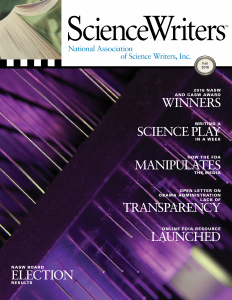Two dozen print and electronic journalists from across the Southeast got a glimpse of what’s coming next in the climate story during Measure Globally, Respond Locally, a mini-conference held August 15 and 16 in Asheville, N.C.
Supported by a generous NASW Idea Grant, the event drew reporters from Wilmington, Del., Charleston, S.C., Atlanta, Louisville, and points in between. At least one participant said he will join NASW. The meeting was organized by members of SCONC (Science Communicators of North Carolina), staff at Duke University and North Carolina State University, U.S. Forest Service, NOAA’s National Centers for Environmental Information, Economic Development Coalition of Asheville-Buncombe County, and a local startup incubator called The Collider.
WRAL-TV weatherman Greg Fishel told the journalists about his conversion from skepticism to acceptance of anthropomorphic climate change, and Western Carolina University’s Rob Young shared his tips for talking to Rotary Clubs and Ruritans about climate science in ways that don’t automatically raise their hackles.
It’s not about temperature predictions, it’s about photos of melting glaciers, Young counseled. There was a “dinner with an expert” session with folks from N.C. State, U.S. Forest Service, NOAA, and the Oak Ridge National Lab.
Field trips were a primary focus for the group. They toured U.S. Forest Service’s Coweeta Hydrological Lab, where stream flow data has been collected every five minutes since 1934. Reporters learned that the Southeast’s water supplies will be affected by changes in the forest canopy from human activity, changing climate and invasive species, all of which is reflected in the streams. The group also heard about an innovative seed banking effort at the N.C. Arboretum. They visited NOAA’s mothership of climate and weather data in downtown Asheville (25 petabytes in all). NOAA staff showed the journalists how they might use this vast resource in their own stories to either take the very long view or a very closely focused view.
Finally, the group enjoyed some locally brewed beers at The Collider. This was a meet and greet with local entrepreneurs who are using NOAA’s data to create companies around what they call “climate resilience”: helping local and regional governments and private entities make smart responses to anticipate changing conditions.
Our deepest thanks to NASW and the Idea Grant committee for their support.
(NASW members can read the rest of the Fall 2016 ScienceWriters by logging into the members area.) Free sample issue. How to join NASW.




